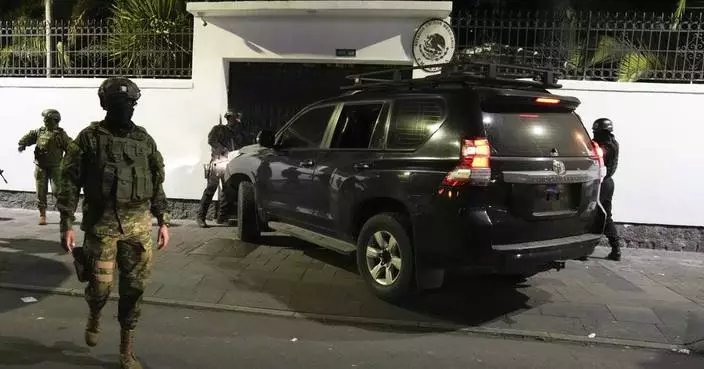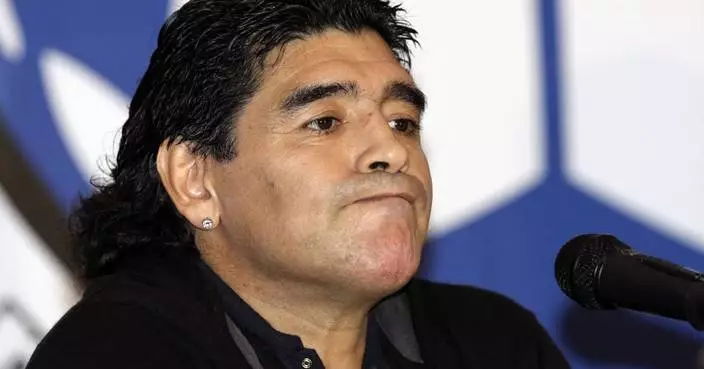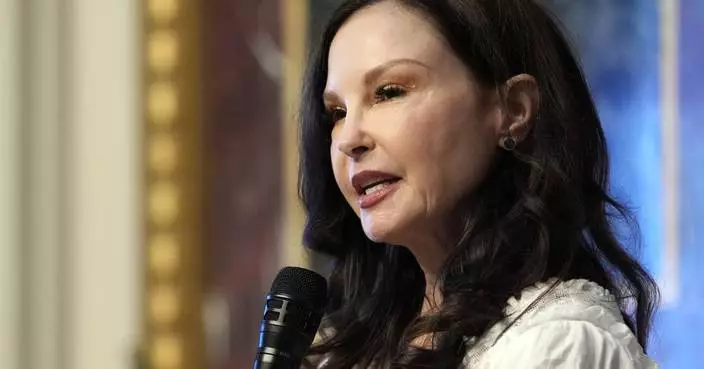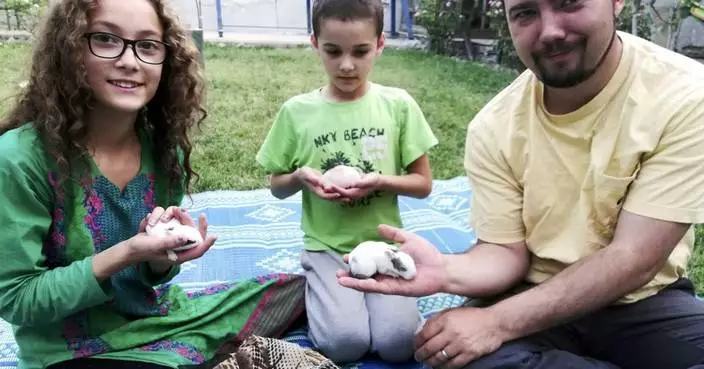The Nobel Peace Prize-winning surgeon whose hospital in war-torn Congo has treated over 50,000 victims of sexual violence has launched a fund with the goal of providing reparations for survivors of conflicts around the world.
Dr. Denis Mukwege said in an interview Saturday that he and his team at Panzi Hospital in eastern Bukavu province could physically and mentally help victims of rape and other abuse, but that the only way to really heal survivors is for society to accept the wrong that was done to them through reparations.
Legal action can be taken against an alleged perpetrator, he said, but even in cases in which women win, "there is no reparation."
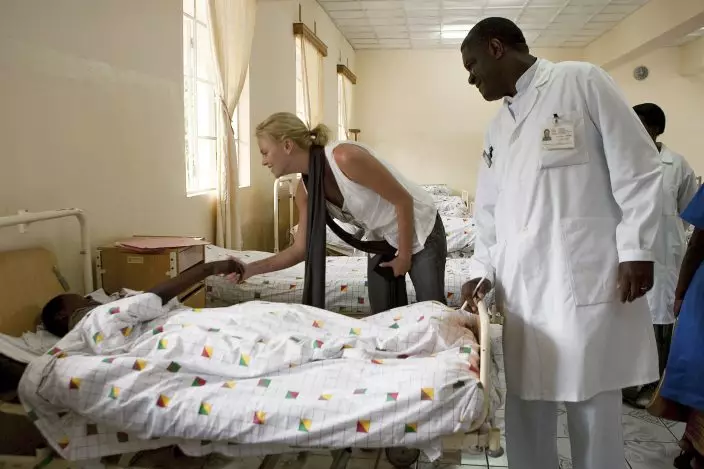
In this March 30, 2009, photo provided by the United Nations, Dr. Denis Mukwege, right, director of Panzi Hospital, stands by actress and U.N. Ambassador for Peace, Charlize Theron, as she visits the hospital in Bukavu, South Kivu, Congo. Mukwege, the Nobel Peace-prize winning surgeon whose hospital in war-torn Congo has treated over 50,000 victims of sexual violence, has launched a fund with the goal of providing reparations for survivors of conflicts around the world. (Marie FrechonThe United Nations via AP)
Mukwege said reparations can be individual or collective, symbolic or financial, depending on the victim, the case and the context.
"In some cases, women are just asking us to ask the leaders to ... say, 'I apologize for what just happened to you because I was maybe the leader in this place and I didn't protect you,'" Mukwege said. "Then maybe for the women, this can be enough."
But in other cases, women might want financial reparations to support them, to pay for school, or to return to previous activities or start new ones, he said, "so this fund really works in different ways, depending with the conflicts."
"For 10 years I was fighting to get a global fund," Mukwege said, "because ... what is happening in Congo is happening everywhere where we have conflict."
The fund is trying to get governments and the private sector to give money, he said, but its board will also include victims of sexual violence and civil society representatives.
France is the first country to commit to the fund, pledging $2 million a year for three years in an important show of support, Mukwege said.
Mukwege is in New York on a tour organized by Doctors of the World, a longtime funder of the Panzi Hospital. It will also take him to California and Washington state to talk to foundations about the fund.
Mukwege is also planning to meet several world leaders and attend events on the sidelines of the upcoming annual gathering of presidents, prime ministers and monarchs at the U.N. General Assembly.
Female victims around the world face similar challenges, Mukwege said, and he has recently seen how sexual violence survivors from the Bosnian war have overcome their problems, "and how they can help Congolese women to help face this big problem."
He also traveled to South Korea to see the "comfort women" used as sex slaves by Japanese soldiers in World War II and visited Colombia and victims of that country's long civil war. He plans to start programs for victims of sexual violence in the Central African Republic and Burundi, he said.
Mukwege shared the 2018 Nobel Peace Prize with Nadia Murad, a Yazidi woman who was raped by Islamic State militants in Iraq and has become a global advocate for victims of sexual violence.
"She and I are working together," he said. "I was in Iraq to see exactly what was happening there, and I hope that this year, I will start to support Yazidi women."
The program will operate in different camps where the Yazidis are, not in the Sinjar region where Islamic State extremists stormed Yazidi communities in 2014, Mukwege said.
Having spent much of his life treating female victims of sexual violence, Mukwege said, "today my policy is to work more with men because I think that it is very important in talking about a positive masculinity."
"We are really in a patriarchal system where men dominate everything and women are treated just as objects," he said. "We need to change our way to treat women and see women in our society and ... let young boys grow up to respect women and understand that women are equal to men — and this has to start very early."
UNITED NATIONS (AP) — The world hasn’t seen anything like the unprecedented destruction of housing in Gaza since World War II, and it would take at least until 2040 to restore the homes devastated in Israel’s bombing and ground offensive if the conflict ended today, the United Nations reported Thursday.
The U.N. assessment said the social and economic impact of the war launched after Hamas’ surprise attack in southern Israel on Oct. 7 has been increasing “in an exponential manner.”
It called the level of casualties – 5% of Gaza’s 2.3 million population -- “unprecedented” in such a short time. By mid-April, it said, over 33,000 Palestinians had been killed and more than 80,000 injured. About 7,000 others remain missing, most believed to be buried under the rubble.
“Every additional day that this war continues is exacting huge and compounding costs to Gazans and all Palestinians” said United Nations Development Program Administrator Achim Steiner.
The report by UNDP and the U.N. Economic Commission for Western Asia paints a dire picture of the struggle to survive in Gaza where 201,000 jobs have been lost since the war began and the economy contracted 81% in the last quarter of 2023.
Abdallah Al Dardari, UNDP’s regional director for Arab states, told a U.N. press conference launching the report that almost $50 billion in investments in Gaza are estimated to have been wiped out in the conflict, and 1.8 million Palestinians have fallen into poverty.
Gaza has been under blockade by Israel and Egypt since Hamas’ 2007 takeover, putting tight controls on what enters and exits the territory. Even before the war, it faced “hyper-unemployment” of 45%, reaching nearly 63% among younger workers.
According to the report, the U.N. Human Development Index – which measures key issues for a long and healthy life, for gaining knowledge and for achieving a decent standard of living – has been pushed back more than 20 years in Gaza.
The “productive basis of the economy has been destroyed,” the report said, with sectors experiencing losses of more than 90%. It estimated that the GDP of Gaza could decrease by 51% in 2024.
“The scope and scale of damages have been unprecedented and still mounting as the war still rages on,” it said.
At least 370,000 housing units in Gaza have been damaged, including 79,000 destroyed completely, the report said, along with commercial buildings.
After previous Israel-Hamas conflicts, housing was rebuilt at a rate of 992 units a year, it said. Even if Israel allows a five-fold increase of construction material to enter Gaza, it would take until 2040 to rebuild the destroyed houses, without repairing the damaged ones.
Al Dardari said that after 51 days of fighting between Israel and Hamas in 2014 there were 2.4 million tons of debris in Gaza. In the current war, he said, there are already 37 tons of debris that need to be removed to make space for temporary shelters and other structures which are critical to return some sort of normalcy to Palestinians in Gaza.
“We haven't seen anything like this since 1945, since the Second World War — that intensity in such a short time, and the massive scale of destruction,” he said.
Al Dardari said the preliminary estimate of the cost of an early recovery program for three years, which would bring hundreds of thousands of Palestinians back to temporary shelters in their original locations with community support, is between $2 billion and $3 billion.
The rough estimate for the overall reconstruction of Gaza is between $40 billion and $50 billion, he said.
But Al Dardari stressed that the immediate focus now is on planning for early recovery.
He said the U.N. senior humanitarian and reconstruction coordinator for Gaza, Sigrid Kaag, and other officials met earlier Thursday with 22 U.N. agencies and went through plans by each one for the initial years after the war ends.
“We are on the verge of developing and finalizing a unified view and early recovery framework that is Palestinian-centered, Palestinian-led and owned by the Palestinian people,” Al Dardari said.
Associated Press Writer Lee Keath contributed to this report from Cairo

The unprecedented destruction of housing in Gaza hasn't been seen since World War II, the UN says

The unprecedented destruction of housing in Gaza hasn't been seen since World War II, the UN says

Palestinians look at the destruction after an Israeli airstrike in Deir al Balah, Gaza Strip, Tuesday, April 30, 2024. (AP Photo/Abdel Kareem Hana)








